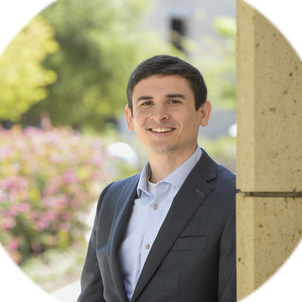But the power of math was completely lost on me. In college, I was torn between majoring in biology, chemistry, and physics, so in my freshman year I settled on taking courses that were common among all three subjects. It just so happened that these were all applied math classes. That caught my attention. I thought, well, math must be a vital field if every subject I’m interested in requires it. After I took a couple of applied math classes, my whole perspective changed. I felt like I was learning how to be a better problem solver, and I knew that was a strength I could carry with me anywhere.
Since then, applied math has become my framework for approaching problems across my areas of interest in the sciences. I enjoy mathematical modeling, which, to me, means looking at a real-world system and trying to figure out how to translate it into something we can analyze with a combination of equations, algorithms, and data. Sometimes that requires thinking about causality, or identifying patterns, or attempting to make predictions, but it almost always involves trying to boil something very complicated down into something much simpler. I’ve found this is a useful first step for approaching many challenging topics, so math has become my strategy for exploring new fields. Thanks to math, I’ve been able to work on a wide variety of interesting problems, from remote sensing of atmospheric methane to cardiac electromechanics to the inner workings of the healthcare system.
One topic I’ve always been passionate about is Earth systems and natural disasters. Growing up in South Florida may have had something to do with that. My first year at Stanford, I was lucky to do a rotation with Professor Jenny Suckale, a professor of geophysics. Her approach to understanding Earth systems is to focus on disruptions from equilibrium – extreme behavior, in other words. I think that’s a fascinating approach because Earth systems are continually acting all around us, but most of the time they don’t cause problems for us. Their typical behavior is what we’ve adapted to as a society. But, when an Earth system deviates from its typical behavior, that often results in what we call a “natural disaster.” Many impacts of climate change can be approached from that perspective, too.
I’m now in the third year of my PhD, working on scientific machine learning with Professor Daniel Tartakovsky. As it turns out, models of complicated systems, such as the climate system, are often really computationally intensive and therefore expensive, both in terms of time and money. This makes it difficult to study these systems, for which we have a lot of uncertainty regarding parameter values and functional relationships. My PhD research is aimed at addressing these challenges, with the goal of improving our ability to study complicated systems more efficiently. The goal is to harness the efficiency of machine learning without its big data requirements. I like this line of work because it requires a lot of creativity in how we think about data and modeling. It also has huge potential for impact across a range of fields, which I find incredibly exciting.
I’m grateful to have received the ICME Student Leadership Award this past year. To me, building community is a big part of leadership in an academic setting. It’s so important that everyone feels comfortable contributing and exchanging ideas and that’s more likely to happen if people enjoy being around each other. I want to make sure ICME feels like that. The great thing about us all having different specialties is that there’s not a lot of competition. We all do slightly different things, but we’re using subsets of the same set of tools and approaches. There’s bound to be somebody in the department who knows more about a topic than you do, whom you can ask for help. I’ve really benefited from this in my research.
Related spotlights

Thomas Colburn

Kayla Patterson

